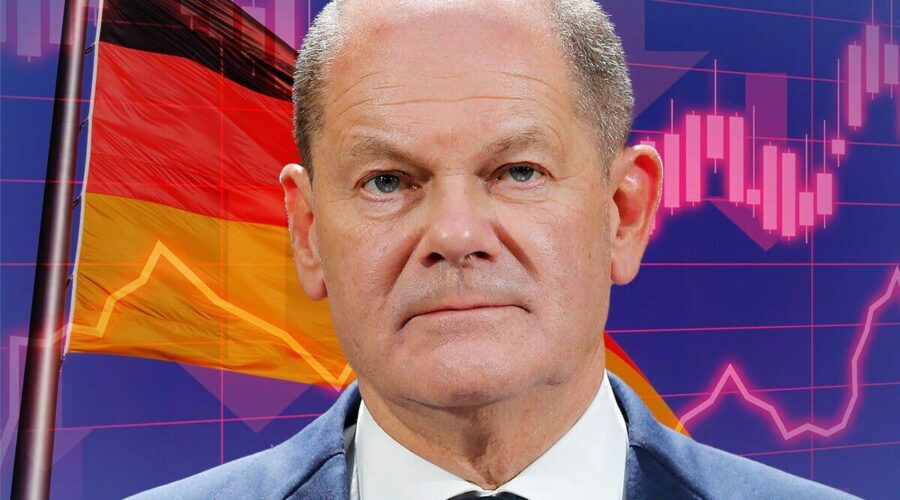Scholz slapped with huge blow as Germany’s economy shrinks by 0.2%
Russian propagandist says if we don’t win the world will disappear
We use your sign-up to provide content in ways you’ve consented to and to improve our understanding of you. This may include adverts from us and 3rd parties based on our understanding. You can unsubscribe at any time. More info
Germany’s economy shrank by 0.2 percent in the fourth quarter compared with the previous three-month period, official figures showed Monday.
Gross domestic product shrank for the first time since the first quarter of 2021 largely because of a decline in consumer spending, which had supported the economy in the first nine months of 2022, the Federal Statistical Office said. The drop followed GDP growth of 0.5 percent in the third quarter and 0.1 percent in the second quarter.
The statistics office said in mid-January, before it had full December economic data, that the economy appeared to have stagnated in the fourth quarter. Monday’s announcement prompted it to revise last year’s full-year growth figure down to 1.8 percent from the 1.9 percent it initially reported.
Germany’s annual inflation rate rolled back from a peak of 10.4 percent in October to 8.6 percent in December, but galloping prices remain a major headache.
A potential energy crunch following Russia’s invasion of Ukraine and the end of its gas supplies to Germany also was a concern last year. But Germany’s network regulator said earlier this month that a gas shortage was “increasingly unlikely” this winter.
READ MORE: Putin readies feared elite tank regiment for new Ukraine offensive


Europe is taking another big step toward cutting its energy ties with Russia, banning imports of diesel fuel and other products made from crude oil in Russian refineries.
The European Union ban takes effect February 5 following its embargo on coal and most oil from Russia. The 27-nation bloc is trying to sever its last uses of Russian energy and stop feeding the Kremlin’s war chest as the anniversary of the invasion of Ukraine nears.
But the newest ban has risks: Diesel prices have already jumped since the war started on February 24, and they could rise again for the fuel that is key to the global economy.
“We’re leaving money in the road to provide our services,” said Hans-Dieter Sedelmeier of the family-run German bus and travel company Rast Reisen.
DON’T MISS:
Russia’s top commanders ‘terrified’ by Putin’s new battle plans [INSIGHT]
‘Russian bashers’ Ukraine partisans kill three officers in car bombing [VIDEO]
Keir Starmer has ‘no policies for getting rid of woke’ [ANALYSIS]
Most things people buy or eat is transported at some point by trucks, which mostly run on diesel. It also powers farm equipment, city buses and industrial equipment. The higher cost of diesel is built into the price of almost everything, helping push up inflation that has made life harder for people worldwide.
Diesel, like crude oil, is sold globally, and Europe could look for new sources, such as the US, India or countries in the Middle East. If that goes smoothly, the impact on prices might be temporary and modest.
The EU’s top energy official, Kadri Simson, says markets have had time to adjust after the ban was announced in June. Europeans also appear to have stocked up on Russian diesel before the deadline, with imports rising last month.
Source: Read Full Article

